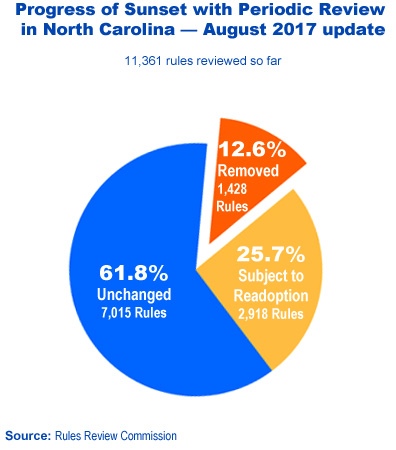In 2015 economists at The Beacon Hill Institute at Suffolk University examined the burden of state regulation in North Carolina. They estimated that state regulations cost the private sector in North Carolina up to $25.5 billion in 2015 (in one year).
This study was not a cost/benefit analysis, so it didn’t look into the tradeoffs. But such a tremendous toll on private enterprise, especially in terms of deadweight loss, makes it all the more important to ensure that state regulations are (1) carefully made, and also (2) periodically checked to see if they’re working, still needed, outdated, or more trouble than they’re worth.
That was the idea behind a 2013 reform bringing sunset provisions with periodic review of state regulations. Rules either are sunset (get repealed) or are reviewed every 10 years.
 One of its provisions made an allowance for regulations that agencies found necessary and that don’t attract public comment. That category encapsulates well over half of state regulations. It lets them continue on without review, which means that even as the reform is doing well — one out of every eight rules is being repealed — it’s not doing as much good as it can.
One of its provisions made an allowance for regulations that agencies found necessary and that don’t attract public comment. That category encapsulates well over half of state regulations. It lets them continue on without review, which means that even as the reform is doing well — one out of every eight rules is being repealed — it’s not doing as much good as it can.
It’s a simple fix, and one endorsed by the chairman of the Rules Review Commission. Get rid of that provision so that all rules either sunset or get reviewed every 10 years.
This simple repair is in House Bill 162, versions of which have already passed both chambers of the General Assembly earlier this year. The Senate has approved the conference report. The House could consider it in the extra session.


